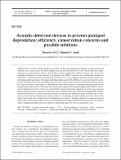Acoustic deterrent devices to prevent pinniped depredation : efficiency, conservation concerns and possible solutions
Abstract
Acoustic deterrent devices (ADDs) to prevent pinniped predation on fish farms and fisheries are widely used, but show highly varying success. Recently, ADDs have also been highlighted as a conservation concern due to their adverse impact on toothed whales. We review the available literature on the efficiency of commercial ADDs, evaluate the unintended impact on behaviour, communication and hearing of marine life, and suggest solutions based on psychophysiological predictions. The main problems associated with ADDs are a lack of long-term efficiency, introduction of substantial noise pollution to the marine environment and long-term effects on target and non-target species. Odontocetes have more sensitive hearing than pinnipeds at the frequencies where most ADDs operate, which may explain the reported large-scale habitat exclusion of odontocetes when ADDs are used. Furthermore, long-term exposure to ADDs may damage the hearing of marine mammals. Fish and invertebrates have less sensitive hearing than marine mammals and fewer efforts have been made to quantify the effects of noise on these taxa. Solutions can be found by decreasing sound exposure, exploiting neuronal reflex arcs associated with flight behaviour and making use of differences in species’ hearing abilities to increase target specificity. To minimise adverse effects, environmental impact assessments should be carried out before deploying ADDs and only effective and target-specific devices should be used.
Citation
Gotz , T & Janik , V M 2013 , ' Acoustic deterrent devices to prevent pinniped depredation : efficiency, conservation concerns and possible solutions ' , Marine Ecology Progress Series , vol. 492 , pp. 285-302 . https://doi.org/10.3354/meps10482
Publication
Marine Ecology Progress Series
Status
Peer reviewed
ISSN
0171-8630Type
Journal article
Collections
Items in the St Andrews Research Repository are protected by copyright, with all rights reserved, unless otherwise indicated.

